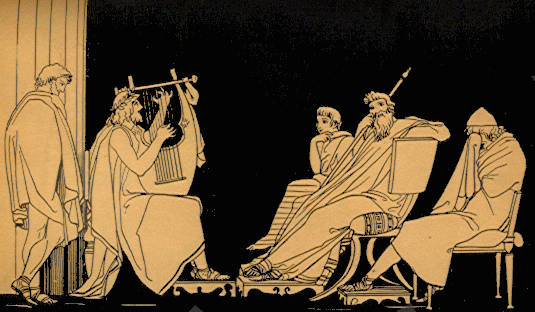Some Odyssey shows give me human insight, like the one I wrote about HERE.
Some Odyssey shows give me classical insight, like the one I wrote about HERE.
And on some very special occasions I get a perfect example of both.
Since my very first Odyssey show, I’ve begun the performance by displaying this image: 
It’s a 19th century artistic rendition of an episode in book VIII of The Odyssey in which Odysseus (all the way to the right) covers his face as he weeps while listening to the blind bard Demodocus (second from the left) sing tales of the Trojan War. You can also see one of the other audience members (likely Alcinous, the King of Phaiacia), watching Odysseus weep.
I chose this image back in 2002 for my very first high school show I suppose because it was easy for me to use as a relevant example of epic oral performance. Like many aspects of what I do, it’s come to signify something much deeper.
I now use the image as an example of how vivid and emotional performances of epic poems were. We see Odysseus moved to tears listening to Demodocus. Near the beginning of the story, we see Penelope weep in response to the song of Phemius, the bard on Ithaka. While words on a page can be moving, there is something about the way music in performance acts on the human brain and it has the potential to provoke a different type of emotional experience than literature.
I’ve come to understand that what I’m after in my performances is the very moment depicted in this image: I want the songs to connect on this deeper emotional level beyond analysis and I want this connection to happen in the context of an audience, i.e., publicly, because that is another component of oral performance that is lost in the conversion to literature: the communal experience of perception which wraps in perceiving and reacting to other audience members’ reactions in real time.
Alice Oswald, in her incredible, incredible poem Memorial, a version of The Iliad, writes that “[Memorial] is a translation of The Iliad’s atmosphere, not its story,” and I’ve come to think of what I do as a translation less of the story and more of the experience of The Odyssey, both in form and emotional substance.
Which brings me to my performance Pacific Lutheran University.
After a day off in Seattle on Sunday to see family, I arrived on the campus of PLU in Tacoma midday. My performance was in the early evening in a beautiful room with high-arching ceilings and perfect acoustics. The audience consisted of students from a Myth class taught by my contact, Professor Eric Thienes, as well as some with a general interest in hearing me perform.
The performance felt very good. I had a certain balance with the room where I could really hear what was going on and that led to a dynamic and confident show, and very productive discussion.
As we wrapped and headed to dinner (after which I was heading to the airport to catch a red eye back to Chicago), Eric confided in me that he had started crying during the song "My Son," which is sung from Odysseus’ point of view as he reunites with Telemachus for the first time since Telemachus was an infant. Eric has a newborn son at home and the parallels between what I was singing and his experience as a father hit a nerve to the point of tears.
As I settled in for my nighttime flight, I thought about Odysseus and Telemachus, and also Eric and his son. I thought about those students, watching their professor have an emotional moment that he maybe even tried to conceal, just as Odysseus did.
And I thought about the fact that in Homer’s Odyssey, Odysseus’ display of weeping ultimately leads him home, and here I was in the darkness, six miles above the earth, smiling quietly to myself, heading home.
